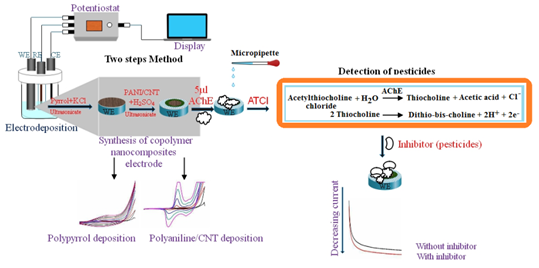
Open Access

Subscription or Fee Access
Conductive polymer nanocomposite enzyme immobilized biosensor for pesticide detection
Subhash B Kondawar, Priyanka D Virutkar, Ashish P Mahajan, Bhavna H Meshram
Abstract
Conductive carbon nanotubes based polyaniline/polypyrrole copolymer nanocomposite (CNT-PANI-PPy) film was electrochemically synthesized on graphite electrode using cyclic voltammetry. CNT-PANI-PPy film formed a biocompatible environment to entrap enzyme molecule and used as biosensor for pesticide detection. This study shows that enzyme based conductive copolymer nanocomposite film itself acts as a mediator. Carbon nanotubes promote electron transfer reactions in presence of acetylcholine chloride (ATCl) as a substrate at a lower potential and catalyzed the electrochemical oxidation of enzymatically formed thiocholine. Surface morphology was studied by scanning electron microscopy which shows a porous structure of the modified film beneficial for enzyme immobilization. Electrochemical behavior of the fabricated electrodes evaluated through cyclic voltammetry and electrochemical impedance spectroscopy. The detection of pesticide (acephate) was performed by chronoamperometry and the limit of detection (LOD) of acephate was found to be 0.007 ppm concentration which is quite low.
Keywords
Copolymer; Carbon nanotubes; Acetylcholinesterase; Pesticides; Biosensors
Full Text:
PDF

Refbacks
- There are currently no refbacks.
ISSN 2394-0867

